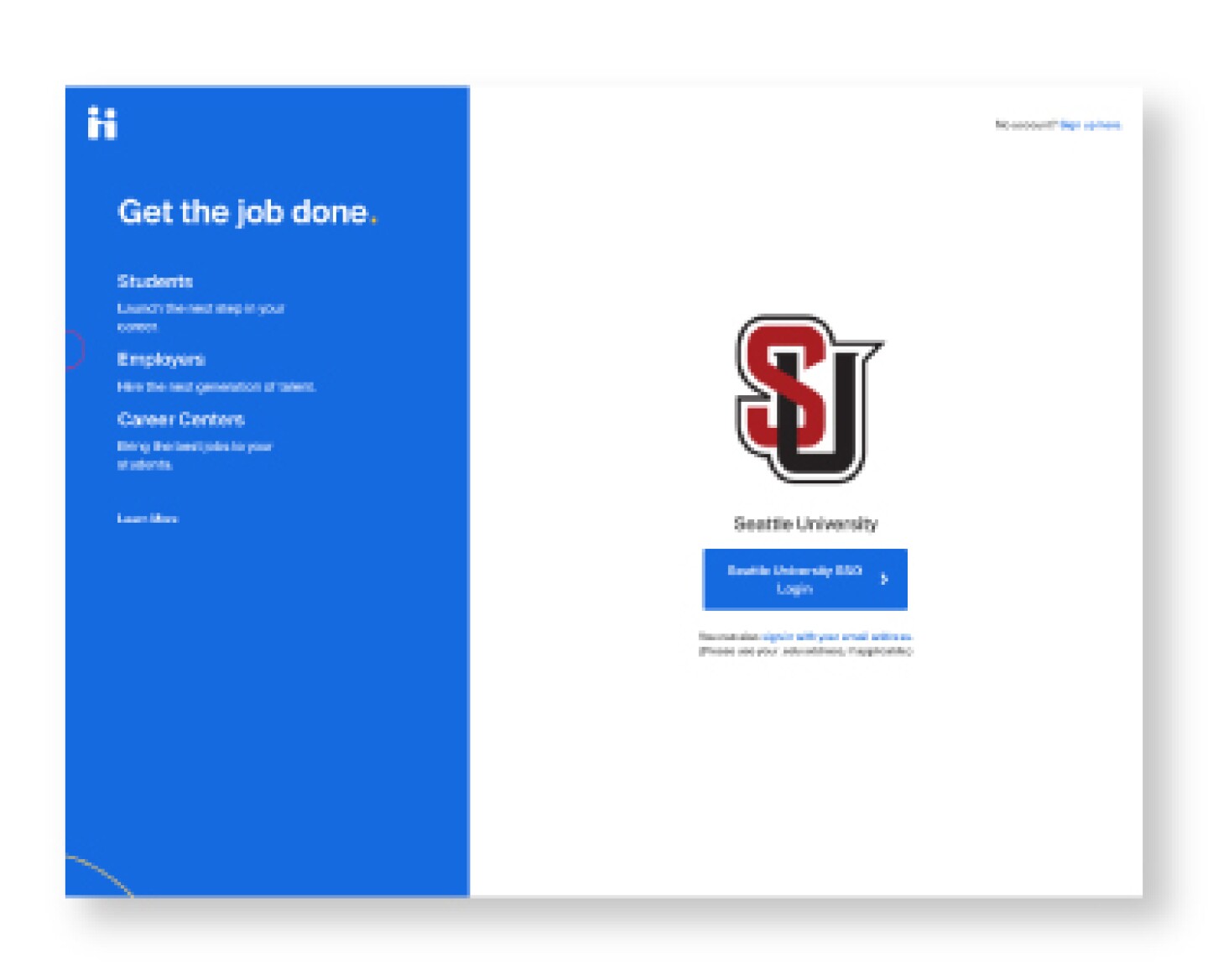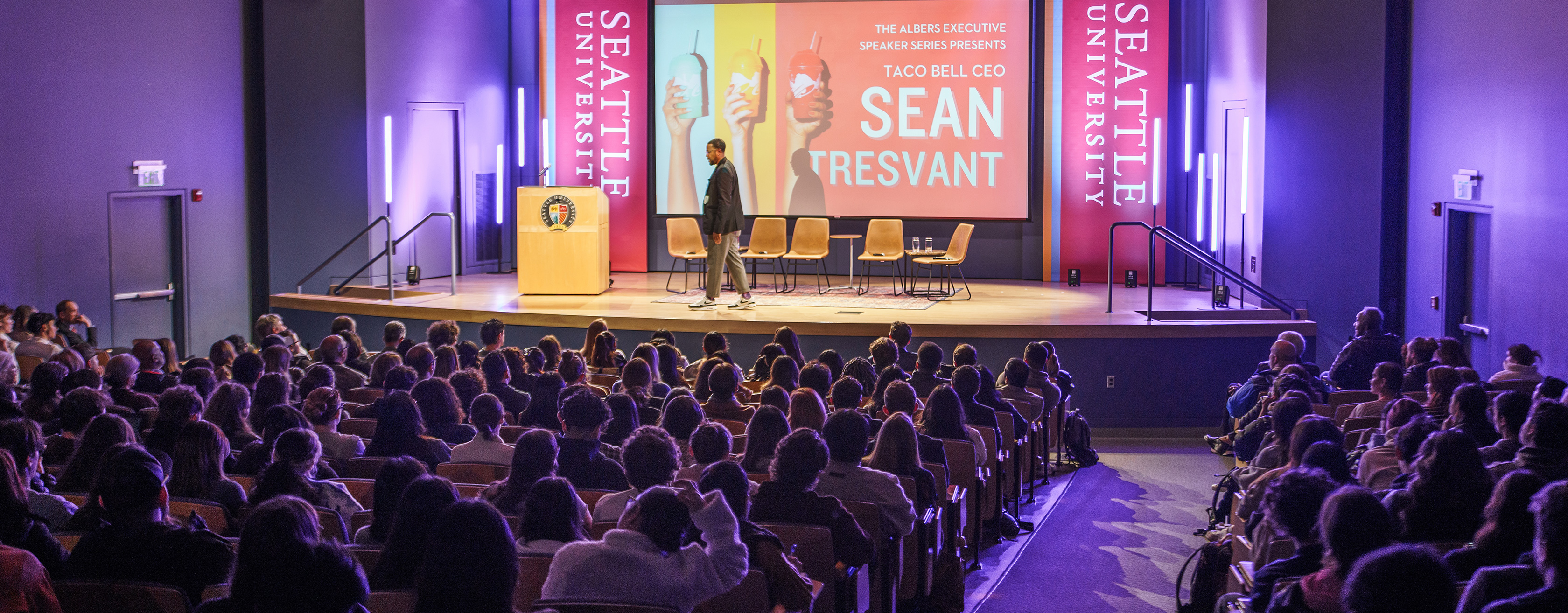Networking Events and Opportunities at Albers
At the Albers School of Business and Economics, we understand that one of the most powerful tools we can offer our Online MBA students is access to a powerful professional network.
But we also know it’s not enough simply to describe the connections you can make at standout companies like Microsoft, Amazon, Boeing, and Zillow. That’s why we go the extra mile to offer you a multitude of online and in-person opportunities to connect with successful, like-minded professionals who share your Seattle University roots.
Read on to learn about the networking resources available to all Albers School of Business and Economics students and alumni, and see how earning your Online MBA at Albers can help you build connections that last a lifetime.
Online Networking Resources
For online Albers students who want to connect from anywhere around the world, we offer several interactive, searchable, easy-to-use networking resources.
Albers Mentor Program
Online MBA students have access to an impressive roster of potential mentors from the greater Seattle business community who are committed to helping students at Albers grow their professional networks and realize their career potential. Participants in the Albers Mentor Program form small groups of up to three students who meet several times a year with their mentor to develop business contacts, access industry information, and gain valuable insights from their mentors’ experience.
Coordinated by the Albers Career Center, the Albers Mentor Program is most convenient for students living in the Seattle area, as it does feature some on-campus events, but successful mentorship relationships can certainly be conducted online. Check out our list of available mentors for more information about your potential connections.

Handshake
A job board and networking platform with a mobile-friendly infrastructure, Handshake (access requires Seattle U ID) connects college students and young alumni to a national network. Handshake’s network gives students access to career opportunities and insights, provides employers with more comprehensive and efficient access to students, and helps colleges and universities increase student employment.


In-Person Networking Events
If you are living in the Seattle area or find yourself passing through town, feel free to take advantage of one of the following on-campus opportunities to meet your classmates and grow your network.
Albers Executive Speaker Series
*The Albers Executive Speaker Series has launched a podcast edition called The Leadership Playbook. Joseph M. Phillips, Dean of the Albers School of Business and Economics, will speak with senior business leaders from the Puget Sound Area. Listen to past podcasts.
Sponsored by the dean's office, the Albers Executive Speaker Series is offered twice a quarter in the fall, winter, and spring. Executives from around the Puget Sound region are invited to speak on a topic of their choice and respond to questions from a selected panel and the audience. These events are excellent opportunities for students across the Seattle University campus and throughout the region to learn from local leaders. The Albers Executive Speaker Series is free and open to the public.
Business Plan Competition
The Harriet Stephenson Business Plan Competition is the year's main event for Seattle University's Innovation & Entrepreneurship Center (IEC). The first several stages of initial business plan submission and screening can be completed entirely online, and the final four student teams are judged in person by prominent early-stage company investors, entrepreneurs, and business leaders from the Seattle area. This is a unique opportunity to showcase your vision and entrepreneurial spirit for some of the most prominent employers in the region.
Albers Ethics Week
The Albers Center for Business Ethics holds an annual Albers Ethics Week, a unique program that hosts dozens of guest speakers from the greater Seattle-area business community for an intensive, week-long examination of ethical issues in business.
On-Campus Career Fairs
If you are close to campus, you may take advantage of regularly scheduled career fairs and events. Career events occur every quarter, including the Business and Engineering Career Fair, a career and internship fair with more than 60 organizations each spring quarter, on-campus interviews, and company information sessions.

Community Service Networking Opportunities
At Albers, we take Seattle University’s reputation as a top school for service learning very seriously. Some of the most valuable connections our students make happen while working together for the greater good in Seattle, throughout the region, and around the world.

RAMP.up
RAMP.up is a unique, experiential learning environment that brings together minds and hearts on campus and beyond to work with underserved local businesses in Seattle's Central Area and surrounding neighborhoods. RAMP.up offers business coaching, resource connections, business planning and other technical support, and project management assistance. Seattle University students receive unique experiential learning and networking opportunities, the university creates deeper connections with its local neighborhoods, and the local businesses gain access to powerful resources and business services.
Albers Center for Global Business
Providing assistance to the business community in Washington state and those pursuing an online business degree in Washington state, the Albers Center for Global Business reaches beyond the academic and business communities to collaborate with and educate other publics throughout the West regarding the significance of the global environment.
Discover Your Next Step
This will only take a moment.
Get the facts.
Download a program brochure.
It includes information about:
- The Online MBA program
- Career opportunities
- The online student experience
- Tuition and financial aid
- Admission requirements

